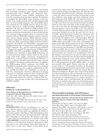 3 citations,
May 1990 in “Journal of Steroid Biochemistry”
3 citations,
May 1990 in “Journal of Steroid Biochemistry” Some women with excess hair growth have a hormone condition that can't be diagnosed by blood or urine tests alone.
1 citations,
November 2016 in “Saengmyeong gwahag hoeji/Saengmyeong gwahak hoeji” New treatments for the autoimmune hair loss condition alopecia areata may include JAK inhibitors and other immunomodulators.
1 citations,
June 1959 in “A M A Archives of Dermatology” Methyl prednisolone helps most patients with alopecia universalis regrow hair.
1 citations,
May 2013 in “Hair transplant forum international” Non-classical 21 hydroxylase deficiency is an underdiagnosed cause of female hair loss and polycystic ovarian syndrome.
 1 citations,
October 2012 in “Gynäkologische Endokrinologie”
1 citations,
October 2012 in “Gynäkologische Endokrinologie” The document concludes that proper diagnosis and individualized treatment are crucial for managing androgenization in women effectively.
 1 citations,
August 2012 in “Journal der Deutschen Dermatologischen Gesellschaft”
1 citations,
August 2012 in “Journal der Deutschen Dermatologischen Gesellschaft” A woman's hyperandrogenism was caused by a genetic mutation leading to non-classic adrenogenital syndrome.
 1 citations,
January 1986 in “Journal of Steroid Biochemistry”
1 citations,
January 1986 in “Journal of Steroid Biochemistry” Women with excessive hair growth or polycystic ovary disease may more often carry a gene variant for 21 hydroxylase deficiency.
 October 2023 in “Journal of the Endocrine Society”
October 2023 in “Journal of the Endocrine Society” The desmopressin stimulation test helped identify an adrenal cause for a patient's Cushing's syndrome.
 January 2023 in “Endocrine Journal”
January 2023 in “Endocrine Journal” Treating classic 21-hydroxylase deficiency requires precise glucocorticoid dosing and attention to individual patient needs, with new treatments showing promise.
 November 2022 in “Journal of the Endocrine Society”
November 2022 in “Journal of the Endocrine Society” The patient likely has Chrousos syndrome, a rare condition causing insensitivity to glucocorticoids, requiring high-dose dexamethasone treatment.
 May 2021 in “Journal of the Endocrine Society”
May 2021 in “Journal of the Endocrine Society” A woman's hair loss and other symptoms were due to a rare hormone deficiency treatable with steroids.
 April 2020 in “Journal of the Endocrine Society”
April 2020 in “Journal of the Endocrine Society” A patient with untreated congenital adrenal hyperplasia had large benign tumors in her adrenal glands removed, improving her symptoms.
New treatments for alopecia areata, like JAK inhibitors and immunomodulators, are promising.
A woman's Cushing's syndrome caused by adrenal cancer improved after surgery.
April 2019 in “Journal of the Endocrine Society” A woman with Cushing's syndrome improved after surgery to remove an adrenal tumor.
 December 2011 in “Korean journal of veterinary research”
December 2011 in “Korean journal of veterinary research” A Miniature Pinscher dog with hair loss and scaling was diagnosed with pattern alopecia and improved with melatonin treatment.
 November 2009 in “Journal of Pediatric Nursing”
November 2009 in “Journal of Pediatric Nursing” Nonclassic congenital adrenal hyperplasia is a common genetic disorder that can cause a range of symptoms and requires personalized treatment.
1 citations,
December 2018 in “Veterinary dermatology” The hair coat disorder in Schipperkes is similar to Alopecia X and involves increased androstenedione levels and hair cycle arrest.
 October 2024 in “Journal of the Endocrine Society”
October 2024 in “Journal of the Endocrine Society” The case highlights the complexity of diagnosing high testosterone in older women and the need for thorough testing.
 30 citations,
June 2019 in “Frontiers in Endocrinology”
30 citations,
June 2019 in “Frontiers in Endocrinology” The document concludes that managing non-classical congenital adrenal hyperplasia in females requires personalized treatment, genetic counseling, and a team of specialists.
 5 citations,
April 2011 in “The Lancet”
5 citations,
April 2011 in “The Lancet” Untreated congenital adrenal hyperplasia can lead to complications like stroke and needs glucocorticoid treatment.
 1 citations,
November 1953 in “Archives of Dermatology”
1 citations,
November 1953 in “Archives of Dermatology” The document discusses various challenging skin conditions and their treatments.
 27 citations,
December 2013 in “Endocrinology”
27 citations,
December 2013 in “Endocrinology” Researchers created a mouse model for Cushing's syndrome to study glucocorticoid excess and potential treatments.
 May 2021 in “Journal of the Endocrine Society”
May 2021 in “Journal of the Endocrine Society” A patient produced cortisol after adrenalectomy, possibly due to residual tissue or other body parts making steroids.
 375 citations,
July 2006 in “Journal of Investigative Dermatology”
375 citations,
July 2006 in “Journal of Investigative Dermatology” Stress can worsen skin and hair conditions by affecting the skin's immune response and hormone levels.
 7 citations,
October 2000 in “Allergo Journal”
7 citations,
October 2000 in “Allergo Journal” Stress may affect hair growth by influencing hair follicle development and could contribute to hair loss.
 1 citations,
February 2016 in “European Journal of Obstetrics & Gynecology and Reproductive Biology”
1 citations,
February 2016 in “European Journal of Obstetrics & Gynecology and Reproductive Biology” An 84-year-old woman's hair loss was due to a rare condition called Leydig cell hyperplasia, which was treated with surgery.
 November 2022 in “Journal of the Endocrine Society”
November 2022 in “Journal of the Endocrine Society” A rare ovarian tumor caused high testosterone and excess hair in a woman, which was resolved after tumor removal.

The conclusion is that endocrinology significantly impacts medicine with various common medications used for treatment.

Chemotherapy can cause skin issues and hair loss, and this guide explains how to manage them.






















